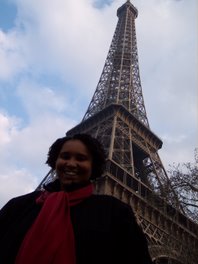FINAL EXAM QUESTIONS (To be completed as essays – two paragraphs minimum).
(open book, open notes)
Loukoum (Choose three of the five)
1. Describe how the article “Polygamy, Disrupted Reproduction, and the State: Muslim Migrants in Paris” relates to Loukoum’s family. Give a specific example within in your answer.
2. Describe how the article “African Women Eliminating Borders” is applicable to Soumana and M’am. Give a specific example from the novel.
3. Choose one of Abdou’s letters (Loukoum’s father) that is particularly thoughtful. Explain how the traditional role of the African male is in direct conflict with life in France.
4. Does Beyala’s description of Loukoum suggest a positive or negative outlook for France’s immigrant youth as they become adults? Explain.
5. Evaluate the intentions of the French social worker, Madame Saddock. Are such social services a help or a hindrance to the African immigrant community?
Essential Encounters (choose two of four)
1. Encouraging a relationship to develop between Joël and Doris, Flo jokes that she is merely following African tradition whereby a woman could chose a second wife for her husband. She soon finds her plan is no laughing matter. Explain why this once acceptable tradition can no longer work in contemporary African society.
2. Besides the situation mentioned in question #1, what other conflicts can tradition impose upon the modern African couple? Give examples from the novel.
3. What is the purpose of adding the character of Zimba to the novel? What does she represent?
4. Analyze the characters of either Flo or Doris in the novel. Are these portraits of strong women or weak women? Explain your answer thoroughly.
Sabra and Chatila / Montjoie Palestine!
1. Explain what happened in Sabra and Chatila.
2. What is the meaning of the expression ‘Montjoie, Palestine!’
3. How do these two prose poems relate to current world events in the Middle East? Why do you think these issues are of interest to French society?
Coquelicot du massacre / Poppy from the Massacre
1. What is the symbolism of ‘poppy’ and ‘massacre’ and how do these symbolisms feed into the overall meaning of the title?
2. How can you relate personally to some of the characters in the novel, Najmé in particular?
3. How are the events that occurred in Lebanon this past summer reminiscent of events in the novel which was written in 1988?
Sitt Marie-Rose / “To Write in a Foreign Language” / Paris When its Naked
(Choose two of the first three, then complete question 4 and 5.)
1. On page 55 of the novel, comment on two ideas expressed: “It’s violence that accelerates the progress of a people” and “Love is a supreme violence”.
2. Why is Sitt Marie-Rose such a threat to her captors? How is it that she is
perceived as an enemy? Explain.
3. In the first two paragraphs, Adnan takes a critical look at Islam and Christianity in Lebanon. However, can this be conceived as a criticism of religion solely in that country? Are there any universals in that criticism? Does the criticism lie with the practices, the texts, or with the followers?
4. Compare “To Write in a Foreign Language” with the experience of other authors or protagonists studied in the course. What implications does language choice have on an author?
5. Choose an excerpt from Paris When it’s Naked which you personally can see in the city of Paris. In addition, is there something that seems strange or inaccurate to you in Adnan’s description? Explain.






No comments:
Post a Comment